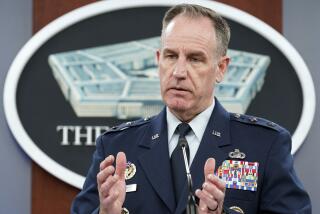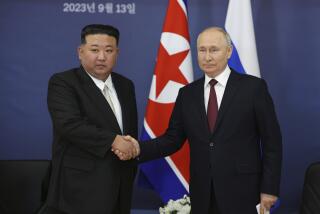U.N. Examines Cracks in Iraqi Import Shield
UNITED NATIONS — As the Security Council waited for a U.S. resolution on Iraq’s alleged failure to disarm, the United Nations on Wednesday examined breaches in the program that regulates the Persian Gulf nation’s imports.
A report on the “oil for food” program notes that the Iraqi economy is improving under rules that allow President Saddam Hussein’s regime to buy humanitarian goods with the revenue from oil sales. But the report also looks into ways Iraq has tried to skirt the program’s restrictions.
In the Security Council session, program chief Benon Sevan said Wednesday that Iraq appears to have ceased asking for kickbacks on oil sales, and Syria insisted that the illegally built pipeline between the two countries is not operational.
Meanwhile, the Ukrainian government announced that its foreign minister will meet here today with senior U.N. officials to account for its alleged sale of an advanced radar system to Iraq, in violation of the world body’s ban on selling military equipment to Hussein’s regime.
Foreign Minister Anatoly Zlenko will respond to U.S. allegations that Ukrainian President Leonid D. Kuchma personally approved the sale to Iraq through a Jordanian middleman of a Kolchuga radar system designed to detect aircraft without alerting the pilots. Kuchma reportedly discussed the transaction in July 2000, the same month his nation held the Security Council’s rotating presidency.
The White House made its charge after analyzing tape recordings made secretly by a Ukrainian presidential bodyguard who later defected to the United States. Bush administration officials believe the tape to be authentic and have suspended about $54 million in aid to the Kuchma government.
The allegation is another in a series suggesting that Hussein has flouted U.N. sanctions designed to limit the acquisition of military goods and manipulated the oil-for-food program designed to ensure that profits go to improve the Iraqis’ health and education. The U.N. program has been criticized for not letting enough money through for humanitarian purposes.
Revenue has dropped sharply in the last six months, the report released Wednesday says, partly because of the sudden political unpopularity of paying illegal surcharges that Baghdad has demanded as part of its oil sales. As war looms, Iraq also is regarded as a potentially unreliable supplier for customers who sign contracts for future purchases.
The resulting decrease in Iraqi oil shipments--from a high of 2.5 million barrels a day two years ago to just 1 million barrels daily--has created a $2.5-billion shortfall in the program’s U.N.-controlled escrow account, Sevan said.
However, U.N. diplomats observed several weeks ago that Iraq has lowered and in some cases dropped the surcharge, apparently to revive sales. Exports rebounded last week to an average of 1.9 million barrels a day.
“They have reduced their request for surcharges,” said Norwegian Ambassador Ole Peter Kolby of the U.N. Sanctions Committee. “I’m very pleased sales have gone up, because everyone is concerned about insufficient funds.”
Hussein has long demanded an end to the stringent U.N. sanctions, which were imposed after Iraq invaded Kuwait in 1990. The requirement that all imports must be funneled through the U.N. slows down the delivery of food and medicine, the Iraqi leader says, and is responsible for the deaths and suffering of hundreds of thousands of his citizens.
While U.N. humanitarian agencies agree that the sanctions system needs to be more efficient, they blame the Hussein regime for the Iraqi people’s poverty. The Security Council says sanctions will not be lifted until U.N. inspectors declare that Iraq is free of weapons of mass destruction.
To that end, the United States put finishing touches Wednesday on a draft resolution to ensure Iraq’s disarmament and sent it to officials in Moscow, Beijing, Paris and London for feedback. The resolution is expected to be introduced before the end of the week but has been delayed by division over how explicit it should be about military intervention.
The Bush administration expresses little faith in the weapons inspection system and wants the U.N. to authorize the use of force against Iraq if the inspectors are stymied. Most Security Council members appear to favor giving inspectors time to work before resorting to an attack.
“The trick is the balance,” said a European diplomat. “It must be something that is firm enough for the Americans and something with a large enough threat so there is no wiggle room, but not so direct [on the use of force], to allow France and Russia to sign on. This is a difficult one to get right.”
*
Times staff writer Robin Wright in Washington contributed to this report.
More to Read
Sign up for Essential California
The most important California stories and recommendations in your inbox every morning.
You may occasionally receive promotional content from the Los Angeles Times.










